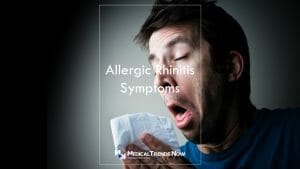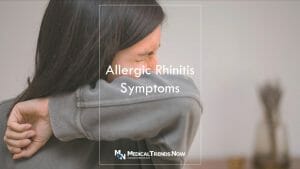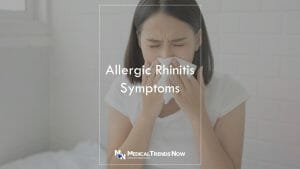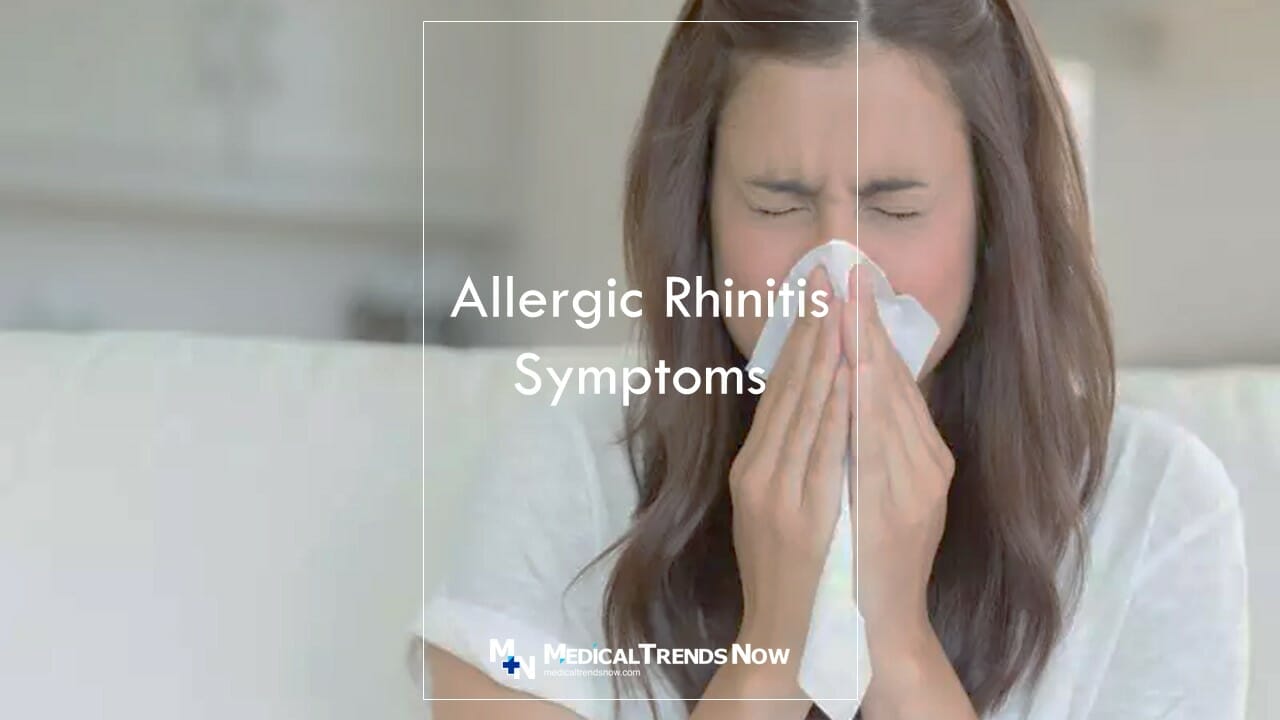Table of Contents
Are you suffering from allergy rhinitis? Learn more about the allergy rhinitis symptoms, causes, and treatment. Find out how to treat your allergy rhinitis naturally, what food to avoid, and how to diagnose it. Read on to learn more and find out the best Filipino doctor who can manage and treat hay fever!
Allergic rhinitis is a common condition affecting approximately 20 million people in the Philippines. According to the published report by the National Library of Medicine, “the overall prevalence of allergic rhinitis in the Philippines based on the 2008 National Nutrition and Health Survey is 20.0%.”
Allergic rhinitis, also known as hay fever in the Philippines, is a condition that causes the nose to become irritated and congested from the pollen and other allergens in the air.
Allergy rhinitis symptoms in Filipinos can vary.
Symptoms of allergic rhinitis in the Philippines include:
1. Nasal congestion
2. Itchy nose or eyes
3. Sore throat
4. Wheezing
5. Coughing
If you or someone you know is struggling with allergic rhinitis, it’s important to be aware of the hay fever symptoms so that you can get treatment as soon as possible.
Here are the five symptoms to look out for:
1. Nasal congestion:
This is the most common allergic rhinitis symptom in the Philippines and is usually the most severe. Nasal congestion can make it difficult to breathe, and it can feel like you’re stuck in a humid tunnel.
Allergic rhinitis is the most common type of allergic disorder. It reacts to certain things, like pollen, pet dander, or other environmental triggers. In people with allergic rhinitis, the immune system over-reacts and creates inflammation in the nasal passages. This can cause congestion, sneezing, and a runny nose. Nasal polyps (small growths on the mucous membranes) are also more common in people with allergic rhinitis.
The allergic rhinitis symptoms vary from person to person and can range from mild to severe. Most people experience nasal congestion as their most severe symptom, but it can also feel like you’re stuck in a humid tunnel. The inability to breathe deeply or easily may make it difficult to work or stay active. Nasal polyps may also be present.

2. Itchy nose or eyes:
One of the allergy rhinitis symptoms is an itchy nose or eyes. It’s not uncommon for people with allergic rhinitis to experience a lot of sneezing and itchy eyes.
When people with allergies react to certain triggers, the body releases histamines. Histamines can cause many symptoms, including a runny or itchy nose, watery eyes, and hives. It’s not always easy to tell if someone has allergic rhinitis because the symptoms can be very mild.
However, if you notice any of the following symptoms in someone with allergies, it’s a good indication that they may have an allergy:
- frequent sneezing and coughing;
- bad breath; red eyes;
- itchy nose or eyes.

3. Sore throat:
One of the common allergic rhinitis symptoms is a sore throat. This usually happens when the nasal congestion makes it difficult to breathe.
Sneezing, runny nose, and itchy eyes are also common symptoms.
Allergies can cause several other health problems, including allergy and asthma, hives, and even anaphylaxis. About 10 percent of people have some type of allergy, but the most common is hay fever.

4. Wheezing:
One of the allergy rhinitis symptoms is wheezing. People with allergic rhinitis often experience wheezing, the sound of air quickly moving in and out of the lungs.
Allergic rhinitis, also known as hay fever, is a condition in which the immune system overreacts to substances in the environment (such as pollen) and creates inflammation and swelling in the nose. This can cause sneezing, runny nose, and itchy eyes.
Wheezing is a common symptom of allergic rhinitis, as air moves quickly through the narrowed passages in the nose.

5. Coughing:
Finally, people with allergic rhinitis are often prone to coughing. This is because the pollen and other allergens in the air can cause inflammation in the lungs.
A person with allergic rhinitis may experience congestion, sneezing, and a runny nose when exposed to pollen or other allergens.
These symptoms can lead to coughing, which in turn can cause more mucus production and inflammation.

What is allergy rhinitis?
An allergy is an immune response to a foreign substance. In people with allergies, the immune system overreacts and produces antibodies when it encounters the allergen again. This reaction can cause inflammation and swelling of the nasal passages and around the eyes, known as rhinitis. Nasal allergies are the most common type of allergy, affecting about 20 percent of adults in the Philippines, North America, and Europe. They’re also more common in people who are allergic to seasonal pollens (seasonal allergic rhinitis), such as birch and grasses. Bronchial allergies affect about 5 percent of adults in North America and are most common in people who are allergic to dust mites or cockroaches. Allergy rhinitis is also called hay fever in the Philippines.
What foods to avoid if you have rhinitis (preventing allergic rhinitis or hay fever)?
If you have rhinitis, it is important to avoid foods that can trigger your allergy symptoms. These symptoms occur while eating/drinking foods such as milk, eggs, peanuts, tree nuts, wheat products, and seafood. If you are not sure if a food is causing your rhinitis symptoms, it is best to avoid it until you can test it and determine if it is the culprit. Additionally, drink plenty of fluids and use humidifier treatments when needed to prevent dehydration. The symptoms of hay fever vary from person to person.
Treatment for allergic rhinitis: What is the fastest way to cure rhinitis?
There is no single answer to this question as the best way to cure rhinitis will vary from person to person. However, there are a few general steps that Filipino patients can take to speed up the healing process: rest, drink plenty of fluids, avoid allergens, and use over-the-counter medications as needed. Additionally, many people find relief by taking allergy medication such as corticosteroids or antihistamines. While there is no guarantee that any one approach will work for everyone, following these tips should help speed up the healing process and help you get back to your normal life as soon as possible.

How do you treat allergic rhinitis?
Some people with allergic rhinitis may need to take medications to control the symptoms. Others may need to use nasal sprays or other methods to relieve symptoms. Some people may need to avoid certain things, such as pollen, grass, or dust. Always talk with a Filipino allergy and immunology doctor about the best way to treat your specific allergy rhinitis symptoms.
What is the difference between rhinitis and sinusitis?
Rhinitis is an inflammation of the nose and sinus. The two conditions can have different causes, but they both involve swelling and redness in the nasal passages and around the eyes. Rhinitis is most commonly caused by allergies, while sinusitis can be caused by various factors, including viral infections and environmental pollutants.
How is rhinitis diagnosed (allergy testing)?
Rhinitis is a common condition that results when the nose becomes inflamed and congested. The most common type of rhinitis is allergic rhinitis, which is caused by a reaction to allergens, such as pollen, dust mites, or pet dander. Other types of rhinitis can be caused by infections (such as bacterial or viral), chemicals (such as paint fumes or perfume), or external factors (such as smoke exposure).
To diagnose rhinitis, your Filipino doctor will ask about your symptoms and medical history. They may also do a physical exam to check for signs of inflammation, such as redness or swelling in the nose. If rhinitis is due to an allergic response, your Filipino doctor may perform tests to determine which allergens are causing the problem. In some cases, Filipino doctors can treat rhinitis with medications that reduce inflammation and symptoms.
What is the most common cause of allergic rhinitis?
Allergy rhinitis is the most common type of rhinitis, affecting around 20 million people in the United States and approximately 5 million in the Philippines. It is a chronic inflammatory disease of the nose that typically causes symptoms during pollen seasons, such as runny nose, sneezing, and itchy eyes. Other causes of allergy rhinitis include pets, latex products, and environmental allergens.
Can stress cause allergy rhinitis?
According to the American Academy of Allergy, Asthma, and Immunology (AAAAI), allergic rhinitis is a common condition that affects up to 20% of the population. It can be caused by various factors, including but not limited to stress, pollution, seasonal allergies, and food allergies. These factors also cause hay fever in Filipinos, whether it is mild allergic rhinitis or patients with allergic rhinitis in a severe allergic condition.
It is important to note that allergy rhinitis can also be caused by other things like sinus infections or head colds. In fact, according to the AAAAI, about 60% of people with allergic rhinitis also suffer from hay fever. So if you’re struggling with allergy symptoms and congestion from a cold or flu, it may be time to seek help from your Filipino doctor.
If you think you might have allergic rhinitis, be sure to consult your Filipino doctor for an evaluation. Many treatment options are available, and depending on the cause of your symptoms, you may only require medication or lifestyle changes.

What will happen if allergic rhinitis is left untreated?
If allergic rhinitis is not treated, the symptoms will worsen over time. The sufferer may experience a constant runny nose, an itchy nose, and sneezing. It may also be difficult to breathe through the nose and throat. In extreme cases, anaphylactic shock can occur, which can lead to death. If allergic rhinitis is left untreated, it can cause serious health problems and even death.
Can lack of sleep cause allergic rhinitis?
A person with allergic rhinitis may experience symptoms when an allergen, such as pollen, comes in contact with the respiratory system. Lack of sleep can worsen symptoms because it can make it more difficult to fight off infections. A lack of sleep can also lead to increased stress levels and an overall decrease in energy levels. All of these factors can lead to an exacerbated condition of allergic rhinitis.
What are pollen and allergen in allergic rhinitis symptoms?
Allergens are substances that can cause allergic reactions in Filipinos. Pollen is the male reproductive cell of flowers. Pollen grains are small, sticky objects that can cause allergic rhinitis symptoms when they are inhaled. Some common allergens include dust mites, pet dander, and grass pollen.
How dust mite affects nasal polyps?
Dust mites are tiny creatures that thrive in moist environments like the nose. They can cause nasal polyps, a type of benign tumor. Dust mites feed on human skin cells, and their saliva contains chemicals that can trigger an allergic response in people with rhinitis and asthma or an allergy to dust mites. The treatment of seasonal allergic rhinitis may include treatment of the dust mite population in the home.

What is Immunoglobulin E (IgE), and can I buy drugs to treat allergic rhinitis without a prescription?
Immunoglobulin E (IgE) is a type of antibody that helps the body’s immune system attack allergic substances. Many over-the-counter (OTC) drugs are available to treat cold-like symptoms of perennial allergic rhinitis, including antihistamines, decongestants, and antihistamine nasal sprays. Some people with severe allergies may need prescription medications to control their symptoms.
What plants cause hay fever?
Allergy rhinitis is a common condition in which people react to pollen from plants. Pollen from grasses, trees, and other plants can cause symptoms such as sneezing, runny nose, and itchy eyes. Some people are more likely to develop allergy rhinitis than others. People who are allergic to dogs or cats may be more likely to develop allergy rhinitis because those animals share some of the same allergens as plants. You can help reduce your symptoms by avoiding having pets in the house.
Pharmacologic treatment for hay fever or allergy rhinitis
There are several pharmacologic treatments available for hay fever or allergy rhinitis. These medications can be administered orally or by allergy shots (injection). The most commonly used pharmacologic treatment for hay fever is oral antihistamines, such as cetirizine (Zyrtec) medicine and levocetirizine (Levocetirizine) medicine. These medications work by blocking the histamine receptors in the nose, which alleviates signs and symptoms of hay fever.
Other common medicines used to treat allergy rhinitis without a prescription include anti-inflammatory drugs such as ibuprofen (Advil, Motrin) and naproxen sodium (Aleve), corticosteroids such as prednisone, and beta-blockers such as atenolol (Tenormin). Some people use immunotherapy, which involves using small amounts of an allergen to help the body build immunity to that allergen. Patients with seasonal allergic rhinitis can also use a nasal spray. If you want to control your symptoms, please consult a Filipino doctor to prevent symptoms, especially children and young adults.
What doctor specializes in allergic rhinitis?
Some Filipino doctors specializing in allergic rhinitis in the Philippines are called allergists and immunologists.
Conclusion
Allergic rhinitis is a type of allergy that affects the nose. It is caused by the body’s immune system reacting to something it thinks is a harmful intruder. This can be anything from pollen to house dust mites. The symptoms of allergic rhinitis can vary, but they generally include congestion, sneezing, and a runny nose. Most people with allergic rhinitis need to take some sort of medication to control their symptoms. There is no cure for allergic rhinitis, but Doctors in the Philippines can treat it with various medications and treatments. Many treatments are available in the Philippines for allergic rhinitis, and you won’t know if you’re suffering from the condition until you get checked out. If you or someone you know is experiencing any of the symptoms listed above, it’s important to see a Filipino doctor as soon as possible.
Sources:
- BioMed Central Ltd: Sabit, M., Wong, C., Andaya, A. et al. Pollen allergen skin test and specific IgE reactivity among Filipinos: a community-based study. Allergy Asthma Clin Immunol 16, 74 (2020).
- Studies on atmospheric pollens in the Philippines – PubMed
- How to Treat Allergic Rhinitis – Unilab
- Prevalence of allergic rhinitis in Filipino adults based on the National Nutrition and Health Survey 2008 – National Library of Medicine
- Allergic Rhinitis Conditions – Ada Health
- Nonallergic rhinitis – Diagnosis and treatment – Mayo Clinic
- Rhinitis, Nasal Allergy, Hayfever | AAFA.org
- Allergic rhinitis – NHS
- Allergic Rhinitis (Hay Fever): Symptoms, Diagnosis & Treatment
- Poor sleep is highly associated with house dust mite allergic rhinitis in adults and children – BioMed Central Ltd
- Rhinitis | Johns Hopkins Medicine
- ABC of allergies: Perennial rhinitis – PMC – NCBI
- Food-induced immunoglobulin E-mediated allergic rhinitis – PMC – NCBI
- Psychological stress and its relationship with persistent allergic rhinitis – PubMed
- Diagnosing Rhinitis: Allergic vs. Nonallergic – AAFP













